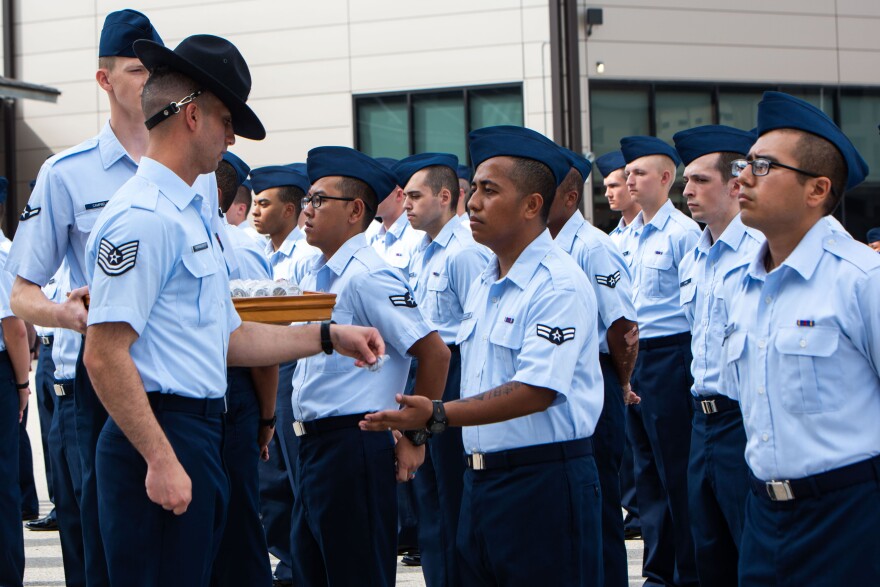On a sweltering July morning at Joint Base San Antonio - Lackland, rows of Air Force trainees marched onto the drill pad of an open-air stadium. Families were perched in the stands, craning to identify their loved ones in the sea of blue uniforms.
After seven and a half weeks of early morning workouts, chow hall food, and loud drill instructors, all of the new recruits were set to graduate from basic military training. But 18 of them were taking an even bigger step.
A partnership between the Department of Defense and Department of Homeland Security allows active duty service members with green cards to become citizens during basic training.
“We have a special opportunity to recognize a significant achievement,” said Master Sgt. Blake Elliott over the loudspeaker during the ceremony. “When applicants take the oath of allegiance to the U.S. Constitution, they become American citizens.”
Trainees from Nepal, Palau, the Philippines, Kenya, Cameroon, Jamaica, Ghana, Togo, Ecuador, Uganda, Malawi, the United Kingdom, Samoa, Micronesia, and Mexico each stepped forward to accept coins signifying their transition into the broader Air Force.
To be eligible for naturalization, trainees must pass a background check, an English and civics test, and a personal interview to demonstrate high moral character.
“It's a little bit overwhelming,” said Joshua Garamfel, 29, one of the new citizen-graduates. “I'm still processing it right now. But it's thrilling. I think I'm just in the moment.”
Originally from the island of Yap, part of the Federated States of Micronesia, Garamfel joined the military to better provide for his growing family. He lived on Guam for nearly a decade, where he studied culinary arts and worked in the hospitality industry. But when COVID hit, everything changed.
“I realized how fragile the tourism industry was and how I was the first one out of a job when the tourism industry basically collapsed,” he said.
Had Garamfel tried for U.S. citizenship as a civilian, the naturalization process could have taken months or years. But through the military, it took just a few weeks during basic training.
“We started the process on day one. Now, at graduation, I’m already done. I think that's the fastest you can go,” Garamfel said.
While citizenship isn’t required to join the armed forces, it is required to re-enlist. Without it, service members don’t qualify for a security clearance, which means many military jobs are off limits.
More than 135 airmen have become citizens during basic training this year.
Colonel J.P. O’Dell, vice commander for the 37th Training Wing at Lackland, helped get the initiative off the ground. He said he admires the trainees’ decision to serve in a new country.
“You and I were born here. We didn't get a choice,” O’Dell said. “They had a choice and they chose to serve. Their backgrounds, education, and life experiences all contribute to making this a better force.”
Basic training naturalizations stopped after policy changes in 2017 made it virtually impossible for recruits with green cards to get through the process. The Defense Department required them to go through extra vetting and get high level approval before they could naturalize.
“They started these brand new background checks that were after enlistment. But they didn't have the capacity to do them timely,” said Margaret Stock, an immigration attorney and retired Army lieutenant colonel. “There was a complete dropoff in naturalizations of people in the military.”
Many of those policies were later challenged in court and found to be discriminatory, clearing the way for the services to pursue basic training naturalizations again. All of the service branches except the Marine Corps are naturalizing green card holders at basic training.
“The Department is constantly reviewing its accessions policies; whether it be accession medical standards or military suitability standards," the Department of Defense said in a written statement. "All applicants for military service are required to undergo background security checks. There is now a much shorter timeline in which Service members can obtain their N-426 (Request for Certification of Honorable Service) than there was in 2018. We have a great partnership with the United States Citizenship and Immigration Service and continue to work with our non-citizen Service members in order to aid, where applicable, their pursuit of naturalization.”
Colonel O’Dell hopes the ability to naturalize during basic training will help the military make a dent in its recruiting problem. He said foreign-born trainees bring language skills and, often, a high level of education.
“I do believe it has taken down a small barrier or hesitancy to enlist," he said. "I think it shows from the Defense Department side that we're invested in their future as well.”
This story was produced by the American Homefront Project, a public media collaboration that reports on American military life and veterans.





